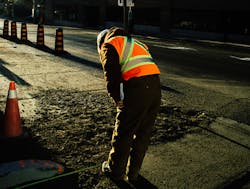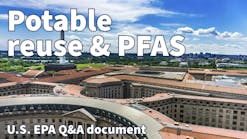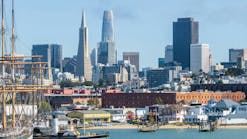CARSON, CA, SEPT 18, 2017 -- The Metropolitan Water District of Southern California and the Sanitation Districts of Los Angeles County today announced a water recycling program that could help refill groundwater basins across Southern California and provide water to hundreds of thousands of homes.
The agencies broke ground on a demonstration advanced purification facility that would generate information needed for the potential future construction of a full-scale recycled water plant.
The Sanitation Districts' Joint Water Pollution Control Plant in Carson currently treats and cleans wastewater discharged from homes and businesses. Under this potential new recycled water program, Metropolitan would purify treated wastewater through various advanced processes to produce a safe, high-quality water source that could help replenish groundwater basins in Los Angeles and Orange counties.
"This is an exciting new chapter for Metropolitan," board Chairman Randy Record said. "We have long supported recycled water projects on a smaller scale, but this is the first time we've embarked on a region-wide project with the potential to become the nation's largest water recycling plant."
Grace Hyde, chief engineer and general manager of the Sanitation Districts, noted the districts' have long supplemented local water supplies with recycled water produced by its inland water reclamation plants.
"Now, we're thrilled about the possibility of cost-effectively recycling the water at our last untapped source, which would let us play a bigger role in helping the region's communities reliably meet their future water needs," Hyde said.
The endeavor marks Metropolitan's latest large-scale investment to diversify the region's water supplies and meet the challenges presented by climate change, ecological demands and Southern California's growing economy. In recent years the agency has invested about half a billion dollars in conservation and local water projects, while at the same time working to improve the reliability of imported water supplies from the Colorado River and Northern California, through projects such as California WaterFix.
"We are seizing the best, most cost-effective, most efficient opportunities to develop and shore-up each of our supplies. Like turf removal and California WaterFix, this recycled water plant is another one of those opportunities," Record said. "Recycled water will provide us a reliable, drought-proof, climate-resilient, local supply."
The 500,000-gallon-per-day, $17 million demonstration facility will take about a year to build and then operate for at least a year to produce data for a potential full-scale plant. While the facility's treatment processes are proven, Metropolitan also will test the innovative use of membrane bioreactors to significantly increase efficiency in water recycling. The demonstration plant will help refine the treatment process and assist in securing regulatory approval for a full-scale plant.
"We all know the technology exists to recycle water in a safe reliable way. We've seen water agencies, including the Sanitation Districts, do it for years," Metropolitan General Manager Jeffrey Kightlinger said. "But we also know that all technology can be improved upon, which we hope the demonstration plant will achieve."
Under a full-scale program, the purified water would be pumped from Carson through a new pipeline network to four groundwater basins in Los Angeles and Orange counties, allowing for additional percolation into the ground and aquifer storage. Those basins, which provide water for 7.2 million people, are currently recharged with imported water, rain and, in some cases, recycled water.
The full-scale program, as envisioned, would produce up to 150 million gallons of purified water per day, enough water to serve more than 335,000 homes. The facility would cost about $2.7 billion to build and $129 million to operate annually, resulting in water costs of about $1,600 an acre-foot—comparable to other new local supplies.
The Metropolitan Water District of Southern California is a state-established cooperative of 26 cities and water agencies serving nearly 19 million people in six counties. The district imports water from the Colorado River and Northern California to supplement local supplies, and helps its members to develop increased water conservation, recycling, storage and other resource-management programs.
The Sanitation Districts are a regional agency consisting of 24 independent agencies serving over 5.6 million people in 78 cities and unincorporated territory within Los Angeles County. The Sanitation Districts protect public health and the environment through innovative and cost-effective wastewater.



